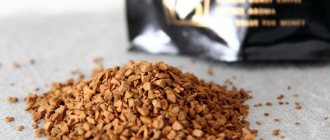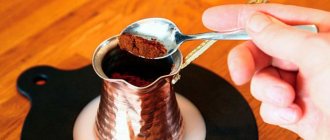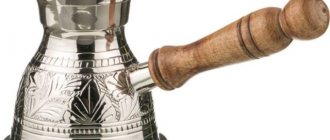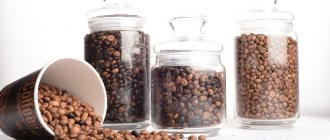When the beans are ground in a home coffee grinder in a larger volume than is necessary for one preparation of the drink or the vacuum packaging is opened, after some time they are exhausted and the drink partially loses its taste characteristics. To store ground coffee at home and ensure that the product does not lose its original properties, you need to provide the right conditions and select a suitable container.
General rules for storing coffee
Coffee beans are very sensitive to temperature changes and bright light, and do not tolerate either excessive heat or cold. They quickly absorb moisture and foreign odors. Essential oils evaporate in the air, causing coffee to lose its taste and aroma. Grains that have lain for a long time in a dry room at elevated temperatures lose moisture and become compacted. If you grind them and brew them, the foam will be unstable.
Oily compounds found in roasted beans oxidize and give the coffee a rancid smell. With increased moisture content, the smell of coffee becomes musty, and nothing can correct this. Damp coffee will develop mold.
Therefore, when storing coffee, you must follow the following rules:
- Coffee is stored in hermetically sealed ziplock bags made of foil or glass, ceramic or metal enameled containers with tight-fitting lids. In plastic and tin containers, coffee acquires an unpleasant odor;
- If you bought a lot of loose coffee, it is better to divide it into several parts, scattering it in bags or containers (preferably opaque). This way the bulk of the grains will have less contact with air. The amount of coffee in each bag or container should not exceed a week's worth;
- In order not to spoil the aroma, you should not pour coffee into a jar where beans of a different type were previously stored. To eliminate the smell of the previous variety, it must be thoroughly washed with vinegar. Ideally, you should purchase separate containers for each type of coffee;
- It is best to keep bags or containers of coffee in a closed kitchen cabinet, located as far as possible from the stove and sink. Cans and bags of spices should not be placed on the same shelf with coffee. A draft is harmful for grains;
- It is not recommended to store coffee in the refrigerator: it is humid and there are a lot of foreign odors. To brew coffee, you will have to periodically remove the jar of beans, and temperature fluctuations deteriorate the quality of the coffee.
Opaque jars are the best option for home use
What happens if stored incorrectly
- Grains oxidize in air, change and even lose their taste, since it is the oil fractions that are responsible for the taste characteristics that undergo oxidation first.
- The aroma weakens and then completely disappears, since aromatic compounds are very unstable and evaporate first.
- The grain structure becomes denser, this leads to the formation of a thin and unstable foam with an unpleasant sour odor.
- Coffee beans absorb moisture, which affects the taste characteristics. Mold quickly appears on wet beans.
- Humidification and oxidation together can lead to grain decomposition.
- Coffee absorbs all foreign odors, which affects its quality.
Before we move on to the specific rules for storing different types of coffee, we will formulate general principles that must be followed if you want to enjoy high-quality coffee.
Storing green coffee
Raw coffee is cheaper than roasted coffee. Manufacturers usually indicate on the packaging the shelf life of green grains - 1-2 years. Green loose coffee will also not lose its properties during this time if it is poured into a hermetically sealed container or bag.
Green coffee should never be kept in the refrigerator or frozen in the freezer.
You can buy loose coffee only if it is fresh: all the beans are the same color, with a pleasant herbal smell and a matte velvety surface. The grain is easy to bite through and does not crumble. Such coffee in an airtight container is guaranteed not to lose its properties for 2 years.
But if the grains are of different colors and sizes, then they are most likely collected from the remains of several harvests. It is unknown how this coffee will behave when roasted. Old grains are too hard, almost devoid of smell, dried out at the edges, and crumble when bitten. It is better not to buy a large batch of old or uneven coffee, as it will quickly lose its taste and aroma. In general, you should not buy green beans with a musty, moldy smell: during roasting it will only worsen, and storing this coffee is out of the question.
The shelf life of high-quality green grains is up to 5, and some varieties – up to 8 years. In Arab countries they even believe that the taste of beans will improve if they are kept in bags for at least six months before roasting. However, in 5–8 years, the taste and aroma of coffee will most likely be gone. A drink made from very old grains is brewed only if you need to cheer yourself up, and there is no decent coffee at hand.
If green coffee has been stored so long that it has almost completely lost its taste and aroma (but has not become moldy or acquired a musty smell), it can be “restored” in one of two ways:
- fry until very dark. With strong heating, residual aromatic substances appear;
- fry with spices: cloves, cinnamon, anise. The coffee beans will be imbued with their aroma.
How to store coffee grounds for scrub
It is recommended to use coffee grounds immediately, until they are fully saturated with all qualities. If you don’t have this option, then put it in a jar and put it in the refrigerator. The recommended period of use is up to 7 days, otherwise there will be a weak effect. Alternatively, it can be tightly sealed and placed in the freezer. In this case, the shelf life will increase four times, but you should not keep the coffee scrub in the freezer.
You can dry the grounds and later use them as tinctures, combining them with beneficial herbs.
Coffee has never lost its popularity, and judging by its variety of uses, it is only gaining it. In Russia, the most common type of coffee is instant coffee, made from low-grade beans. Its storage conditions are less strict, but the taste is far from true.
To experience the real aroma of an invigorating drink, take freshly roasted beans, process them in a coffee grinder and make coffee, after which you will definitely not want to go back to instant.
Did you like the article? Was she helpful?
Storing coffee beans (roasted)
The shelf life of purchased roasted beans depends on the packaging:
- loose coffee, which is sold in specialized stores and packaged in ordinary paper bags, is stored for no more than 2 weeks;
- the shelf life of coffee beans packaged in sealed four-layer paper bags is up to six months;
- if there is a polymer film inside such a bag, the shelf life of coffee increases to 9 months;
- Roasted coffee can be stored for a year in heat-sealed film or foil bags equipped with an air valve;
- in factory-made opaque jars with lids - up to 1.5 years;
- in vacuum packaging – up to 1.5 years.
Once the package is opened, the coffee should be used within 12–14 days. If the package has an air valve and a clasp, the coffee may not be poured into a separate container. After each use, press down on the bag to release the air and close the clasp.
If, when opening the foil package, it is damaged, the coffee must be poured into a container with a tight-fitting lid. They do the same with coffee that they roast themselves at home. Instead of containers, foil bags with zip-lock fasteners are sometimes used.
Sealed bag with degassing valve
Beans roasted at home are placed in bags and containers no earlier than 3-4 hours after roasting: this time is required for carbon dioxide to evaporate from the grains. On the first day after packing roasted coffee into bags, they may swell due to the release of carbon dioxide. In such cases, you should open the clasp slightly and press on the bag.
But if there is too much roasted coffee and it cannot be completely used in two weeks, experts recommend blast freezing the beans. To do this, you need a freezer with dry freezing. The grains are divided into portions and poured into ziplock bags. There must be exactly one serving in the bag: coffee cannot be re-frozen.
Packaged coffee is placed in the freezer away from meat, fish and cottage cheese. In the freezer, roasted beans retain their taste and aroma for 2 months.
If you accidentally find an unopened sealed package of roasted beans on a cabinet shelf, the shelf life of which expired no more than 2 years ago, do not throw it away. You need to open the bag, smell and inspect the coffee. Stale grains are dark in color, have an oily sheen, and smell like rancid oil. If the aroma has weakened, but there is no unpleasant odor, the beans can still be used to make milk-coffee cocktails or coffee with spices.
Roasted beans stored in unsealed packaging are much worse. But sometimes they are usable even 3 years after roasting. The main thing is that there is no rancid smell.
Storing ground coffee
Baristas claim that ground coffee begins to deteriorate within 4 minutes of grinding. But the average coffee lover is not always able to prepare a drink from freshly ground beans.
Shelf life of ground coffee:
- in sealed packaging – 1 year;
- briquettes in vacuum packaging – 1.5–2 years;
- coffee after opening the package – 2 weeks;
- freshly ground coffee – 2 weeks.
To preserve the smell and taste, ground coffee can be first wrapped in foil, then placed in a container with a tight-fitting lid. To extend the shelf life of freshly ground coffee, it is blast-frozen: poured into portioned bags and placed in the freezer. The shelf life of this coffee is 2 months. Like beans, ground coffee cannot be re-frozen.
It is very important to seal the bag tightly
Ground coffee in unopened sealed or vacuum packaging is suitable for brewing for a year after the expiration date. Coffee poured into a jar or wrapped in foil can be consumed throughout the year, but you should check for a rancid smell.
Can it be stored in the refrigerator?
Many people advise storing coffee in the refrigerator - supposedly the esters do not erode at subzero temperatures.
In fact, due to their dense structure, oils do not evaporate anyway. Only the aroma disappears. The problem is not cold, but oxidation, so it is important to avoid contact with oxygen throughout the coffee's shelf life. It is not recommended to keep the product in the refrigerator compartment - it is humid, there are a lot of odors, temperature fluctuations when opening the door. To increase the shelf life of coffee beans at home, you can place them in the freezer, but only if you have a dry freezer.
There the product can be kept for 2 months, during which it will retain its rich bouquet. Please note that repeated freezing is not permissible, otherwise the structure of the beans will be damaged. It is best to store portions wrapped in foil and stored in a closed container.
Storing instant coffee
Instant coffee is the result of complex processing of beans. The powder is artificially flavored, and if the package is unsealed, the essential oils evaporate faster than from natural ground coffee. It is advisable to store opened packaging in a dark, dry place.
Manufacturers usually indicate a shelf life of 2 years. After this time, instant coffee loses its aroma. It is unknown what reactions the chemical additives contained in the powder will undergo, so it is better not to take risks and not drink expired instant coffee.
Shelf life and shelf life of different types of coffee
| Type of coffee | Shelf life | Best before date |
| Green coffee | 1–2 years | 5 years |
| Roasted beans in packaging | 1–1.5 years | 2–3 years |
| Roasted beans without packaging | 2 weeks | 2–3 years |
| Ground coffee in packaging | 1–1.5 years | 2–3 years |
| Freshly ground coffee | 2 weeks | 2–3 years |
| Coffee capsules | 1–2 years | 5 years |
| Instant coffee | 2 years | 2 years |











